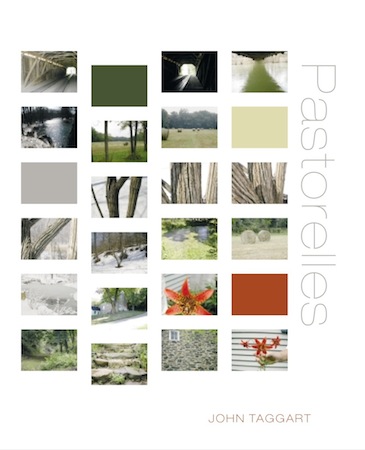Writing after reading 'Pastorelles'

A few years ago I was having beers with a couple of friends. Most of our conversation centered itself around poems and books that had stayed with us, or surprised us in ways we couldn’t have imagined. Someone would offer up a title and a discussion, tangent, poem, or line would follow. I remember how quiet they went when one of them mentioned John Taggart’s Pastorelles. How they just looked at one another and slowly smiled.
A month or so later I started reading Pastorelles, and I understood that quiet.
I was struck by so many things. The repetition that created a multiplicity and exactness simultaneously, the subtlety and boldness of the slash, a similarity in the landscape of the rural Pennsylvania I grew up in, and a lived feeling in the poems. In “Pastorelle 7” Taggart writes,
the problem is not finding a rock there are
many
the problem is not turning
into a rock
the problem is a problem of how
far how far can I throw myself and how far can I
throw myself again[1]
I can’t imagine anyone who writes poems not understanding that struggle. That exactness. I can’t imagine anyone alive who wouldn’t understand that struggle. That multiplicity.
For a number of years I had wanted to attempt a series of poems that would consist of a box of words that potentially could be read in any direction. It was daunting, and so it stayed as something to try later. When I read “Pastorelle 7” I decided to “throw myself again” at/into the idea. I came to see through Taggart’s poetry what my earlier thinking was missing, and that was a living conversation. The active conversation that happened as I read and thought towards my own writing reminded me of Peter Gizzi’s “A Panic That Can Still Come Upon Me”:
It was an effort
if I wanted to go all over a word
and live inside its name, so be it.[2]
The poems in Pastorelles do more than just evoke or create people, places, and time. The poems allow us to dwell and participate, to “live inside” the people, places, and times through our reading and writing.
Note: “For/After Again” is a revisiting of the five footnotes in “For/After” while rereading Pastorelles. “For/After” originally appeared in Little Red Leaves 5.
For/After
voice[1] abutted stones[2] abutted shore
open edge mudded object song
=
myself[3] abutted you[4] _____[5] listen
edge middle edge abutted again
1. to be one day winter the next spring
2. the burden of/
3. and a want for an anchorless heart
4. unmapped keeper of pieces and imaginings waiting
5. the ponderance of the slow/fast side of the river
says/means what it has always
before and after listening
our listening
For/After Again
Voice
these things
such words
letter voice bound to be
unfolded and folded
again:
not much is new except
rain not new rain but same
constant made still
soil mudded
sunday sky house color
gray word weathered
gray
Stones
the difficulty of the same
difference trucked in and spilled over
shore made over
the same word heavy
words
home/
a staying word
better /another place of
Myself
of
a past
tense of
again
present
You
a direction towards a
heart in the heart of
a line
that stills
______
listen
edge middle edge
abutted
again
1. John Taggart, Pastorelles, 1st ed. (Chicago: Flood Editions, 2004).
2. Peter Gizzi, The Outernationale, Wesleyan Poetry (Middletown, CT: Wesleyan University Press, 2007).
Edited by Matthew Cooperman